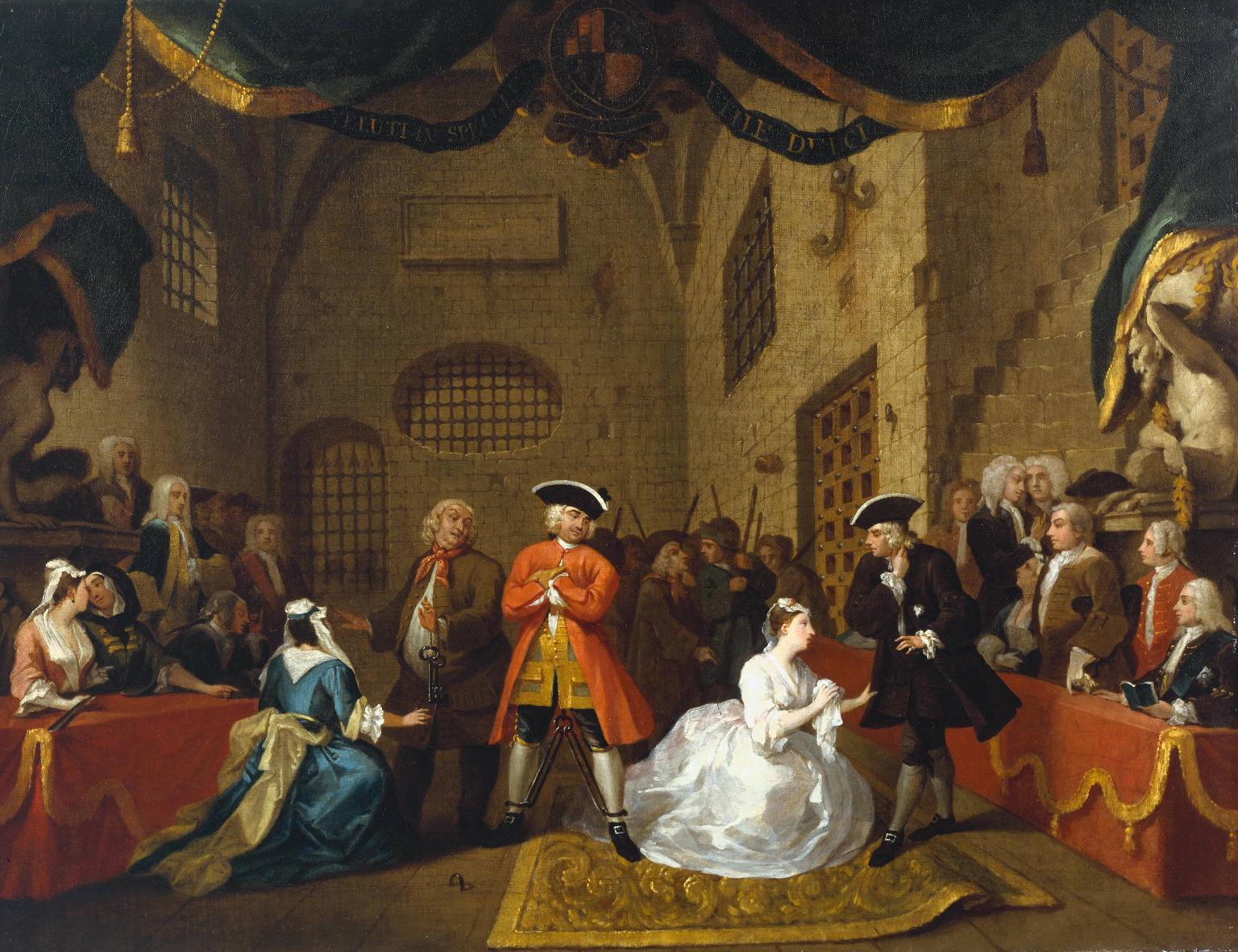Friday
After learning last Friday that Trump has boasted of being a serial sexual assaulter, we saw him deny any such assaults in Sunday’s presidential debate. Apparently this denial has prompted a number of women around the country to share stories of Trump groping them or walking into dressing rooms when they were unclothed. Slate is keeping a running tally here.
If this is what finally ends Trump’s bid for the presidency, it will resemble the final takedown of Macheath, a.k.a. Mac the Knife, in John Gay’s 1728 musical Beggar’s Opera. Although he is married to Polly Peachum, the glamorous highwayman cannot stay away from the ladies, and in the end they bring him to the gallows.
I don’t see Donald Trump as a Macheath, even though I think he would like to see himself as one. Macheath is a more openhearted and generous rogue than Trump is. I do think, however, that the tremendous popularity of the play helps explain some of Trump’s popularity with his fans. Eighteenth-century audiences loved watching Macheath slip out of one jam after another, and Trumpistas have applauded as their man has slipped out of one supposedly fatal gaffe after another. How many times over the past year have pundits declared Trump’s campaign dead, only to be proven wrong? Trumpistas love it when the Donald sticks it to the authorities.
In the play, Mac makes the mistake of marrying the daughter of his fence, who thereupon bribes the highwayman’s favorite whores to turn him in. Although Mac should play it safe (stick to the teleprompter), he has some of the Donald’s effrontery and continues to behave as he always has.
When he is captured, Macheath sounds like Trump turning on his accusers:
Was this well done, Jenny?—Women are Decoy Ducks; who can trust them! Beasts, Jades, Jilts, Harpies, Furies, Whores!
(Sings) At the Tree I shall suffer with Pleasure,
At the Tree I shall suffer with Pleasure,
Let me go where I will,
In all kinds of Ill,
I shall find no such Furies as these are.
The capture doesn’t end it for Mac, however, any more than the McCain gaffe or the Megyn Kelly gaffe or the disabled reporter gaffe or the etc., etc. ended it for Trump. Mac seduces the daughter of the jailor and escapes again. Then he returns to his whores and is captured again. By the end, every woman he has ever impregnated shows up:
Jailor. Four Women more, Captain, with a Child apiece! See, here they come.
[Enter Women and Children]
Macheath. What—four Wives more!—This is too much—Here—tell the Sheriff’s Officers I am ready.
Yet Macheath slips his shackles one last time in Gay’s famous ending. This time, however, it takes intervention from the play’s beggar author to save him:
Player: But, honest Friend, I hope you don’t intend that Macheath shall be really executed.
Beggar: Most certainly, Sir.—To make the Piece perfect, I was for doing strict poetical Justice.—Macheath is to be hanged; and for the other Personages of the Drama, the Audience must have supposed they were all either hanged or transported.
Player: Why then, Friend, this is a downright deep Tragedy. The Catastrophe is manifestly wrong, for an Opera must end happily.
Beggar: Your Objection, Sir, is very just, and is easily remov’d. For you must allow, that in this kind of Drama, ’tis no matter how absurdly things are brought about—So—you Rabble there—run and cry, A Reprieve!—let the Prisoner be brought back to his Wives in Triumph.
This is the Trumpista fantasy, not to mention the nightmare for the rest of us. Although Trump’s sexual assaults appears to be “the final straw” and Clinton is up in the polls, will he escape one last time and make his way to the White House? Will we have Trump triumphantly singing some version of Mac’s closing song:
But think of this maxim, and put off your sorrow,
The wretch of today may be happy tomorrow.
If so, God help us all. Pray for poetical justice and go vote.
Further thoughts:
Both Trump and Macheath use slippery language to get out of scrapes. In Trump’s case, he effectively throws whatever he is accused of back on his opponent while labeling any of his offensive remarks as courageous instances of political incorrectness.
For many, the thrill of Trump is watching him wriggle out of situations that would take down any conventional politician. For his part, Macheath is such an electric character that he helped assure the success of Bertolt Brecht’s 20th century adaptation, Three Penny Opera, and he helped the career of Frank Sinatra, whose “Mac the Knife” was one of his signature songs.



One Trackback
[…] I’ve compared Trump to Mac the Knife and now, with this Figaro parallel, I’m convinced that much of […]